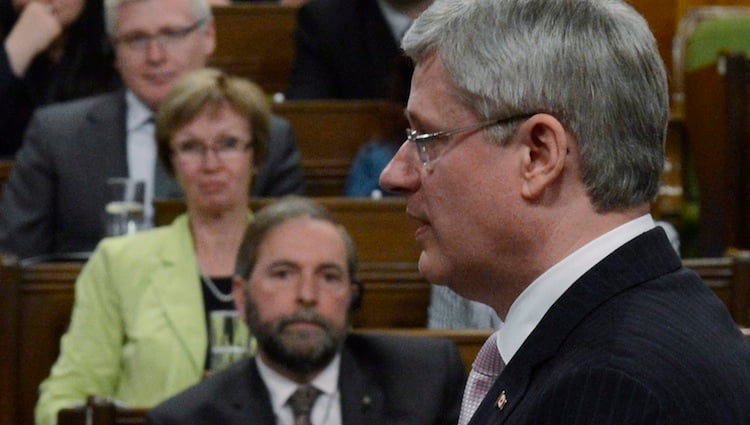Hug it out, federalists
Paul Wells explains why Stephen Harper called Thomas Mulcair
Prime Minister Stephen Harper answers a question during Question Period in the House of Commons on Parliament Hill in Ottawa, Tuesday May 28, 2013 as NDP Leader Tom Mulcair looks on.THE CANADIAN PRESS/Adrian Wyld
Share

The news that Stephen Harper spoke to Thomas Mulcair this week about the Quebec election is encouraging and shouldn’t be surprising. Although, yes, it’s a bit surprising: the Harper who consults and who considers unfamiliar perspectives hasn’t been much on view lately. But he’s been spotted a few times in the past. In 2006, before he introduced the motion recognizing “the Québécois” as a nation within a united Canada, the prime minister made a bunch of calls, including one to Stéphane Dion, but none to any other Liberal leadership candidate.
Then as now, it was possible to imagine Harper had some devious motive. Maybe he wanted to lay a little PM mojo on Dion so he could win the Liberal leadership and lose the next election! Maybe he’s talking to Mulcair now as a way of diminishing Justin Trudeau! But it’s at least as likely, and to me quite a bit likelier, that he made both calls out of simple interest in what he’d hear.
Mulcair faced Marois for 13 years in Quebec’s National Assembly, during a period when government and opposition changed hands. Their ridings were in suburbs north and south of Montreal Island; between them, roughly, Philippe Couillard got elected in Montreal and served as a cabinet colleague of Mulcair’s. There aren’t 20 people Harper could call who’d have a better read on both protagonists in this election campaign. Justin Trudeau doesn’t know either leader a quarter as well. That may sound like I’m picking favourites, but it’s also just true. If you want advice on playing guitar, don’t call me.
More generally, it would be good if supporters of the various national political parties were a little less eager to point-score over their differences on dealing with Quebec separatism. There are certainly differences. Mulcair has said he won’t state a preference, even between sovereignists and federalists, in the current Quebec provincial campaign. He’s long been categorical that a simple 50% + 1 majority in a secession referendum would be a clear enough result to trigger secession negotiations. Liberals don’t like either position, and many believe they will seriously hurt Mulcair’s chances in the next federal election, especially outside Quebec.
But maybe this particular attempt to turn Mulcair’s words into Liberal votes could wait until after the Quebec election. If Marois’s PQ wins a majority, there’ll at least be an extended period of anxiety over whether she’ll parlay that win into a third secession referendum. The leaders of all federalist parties — Conservative, NDP and Liberal in Ottawa, Liberal in Quebec City, maybe even François Legault’s CAQ party — will need to coordinate closely on strategy. To say the least, they haven’t been in the habit of coordinating lately.
And if Pauline Marois spirals into oblivion and loses the Quebec election badly, it’ll still be a good idea for leaders of political parties to talk about important issues, away from the glare of theatrical combat, now and then.